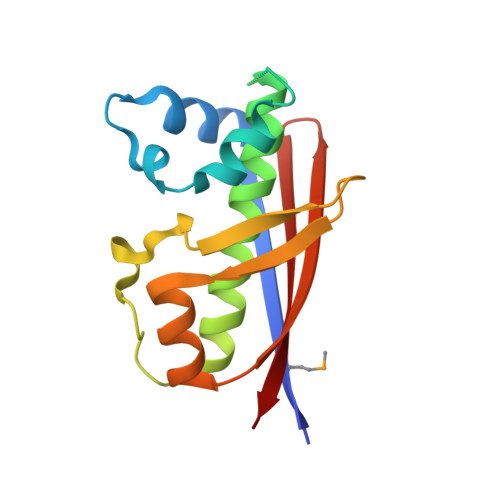Mycobacterium tuberculosis acyl carrier protein synthase adopts two different pH-dependent structural conformations.
Gokulan, K., Aggarwal, A., Shipman, L., Besra, G.S., Sacchettini, J.C.(2011) Acta Crystallogr D Biol Crystallogr 67: 657-669
- PubMed: 21697604
- DOI: https://doi.org/10.1107/S0907444911020221
- Primary Citation of Related Structures:
3NE1, 3NE3, 3NE9, 3NFD - PubMed Abstract:
The crystal structures of acyl carrier protein synthase (AcpS) from Mycobacterium tuberculosis (Mtb) and Corynebacterium ammoniagenes determined at pH 5.3 and pH 6.5, respectively, are reported. Comparison of the Mtb apo-AcpS structure with the recently reported structure of the Mtb AcpS-ADP complex revealed that AcpS adopts two different conformations: the orthorhombic and trigonal space-group structures show structural differences in the α2 helix and in the conformation of the α3-α4 connecting loop, which is in a closed conformation. The apo-AcpS structure shows electron density for the entire model and was obtained at lower pH values (4.4-6.0). In contrast, at a higher pH value (6.5) AcpS undergoes significant conformational changes, resulting in disordered regions that show no electron density in the AcpS model. The solved structures also reveal that C. ammoniagenes AcpS undergoes structural rearrangement in two regions, similar to the recently reported Mtb AcpS-ADP complex structure. In vitro reconstitution experiments show that AcpS has a higher post-translational modification activity between pH 4.4 and 6.0 than at pH values above 6.5, where the activity drops owing to the change in conformation. The results show that apo-AcpS and AcpS-ADP adopt different conformations depending upon the pH conditions of the crystallization solution.
Organizational Affiliation:
Department of Biochemistry and Biophysics, Texas A&M University, College Station, TX 77843-3474, USA.
















